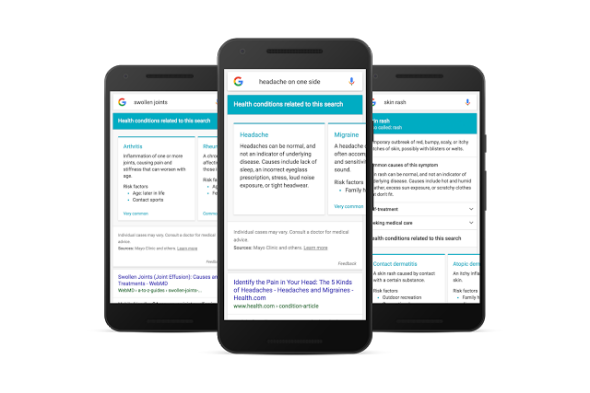Sometimes when you’re feeling ill, the only thing worse than uncertainty is a little bit of knowledge. Start searching for more information about your symptoms, and you’ll be sent spiraling, each twitch and twinge a signifier of some unfolding tragedy. A source of anxiety for patients, the practice is also predictably maddening for physicians, forcing them to reckon with often-dubious internet-enabled portents before they can issue their own findings.
Now, Google is trying to do something about this informational impasse, tweaking the way it presents its search results in an attempt to provide better information. In an official blog post, cleverly titled “I’m Feeling Yucky,” the company explained that it would be incorporating symptom searches into its Knowledge Graph feature.
Instead of simply providing you with a list of possible responses to your query, Knowledge Graph offers an array of options across the top of the screen. Search for “Stephen King novels,” for example, and you’ll see a neatly ordered lineup of covers. If you click on one of those covers, Google will direct you to a search page for that book. In theory, this system allows you to start broad and subsequently delve deeper, helping you settle on a path when you have only the vaguest sense of your destination.
Now, Google will use that same setup to provide more information about the possible causes of symptoms. In its blog post, the company gives the example of a search for “headache on one side,” claiming that Knowledge Graph will soon furnish an array of “related conditions,” such as “migraine,” “sinusitis,” and “common cold.” (No word yet on whether they’ll add accompanying images, which hopefully won’t be as scary as those King covers.) Though it’s not yet widely available, Google says it is “rolling this update out on mobile over the next few days, in English in the U.S. to start.”

The good news here is that by showing off an array of possibilities Google will now be less likely to lead patients directly to cancer—or whatever other worst-case scenario the algorithms would have prodded you toward in the past. With Knowledge Graph, you should immediately see a wider range of possibilities, making it a little harder to immediately assume the worst.
It’s also a promising development for beleaguered physicians tired of panicked patients bringing in reams of inaccurate information to the consultation room. Google is working to help users figure when and how to get more information, offering details about “self-treatment options and what might warrant a doctor’s visit,” meaning it might stave off a few unnecessary emergency-room visits. It also claims, “We worked with a team of medical doctors to carefully review the individual symptom information, and experts at Harvard Medical School and Mayo Clinic evaluated related conditions for a representative sample of searches to help improve the lists we show.”
That’s helpful to know, but it’s also a reminder that Google relies less on autonomous algorithmic calculations than some assume. That may be for the best: Researchers have repeatedly shown that Google’s automated search results are often strangely biased—especially where political queries are concerned—and sometimes downright bizarre. As Mark Graham has argued in Future Tense, this is at least partly because the web is now set up to meet the needs of machines. If nothing else, Google’s new medical search system aims to put some of the focus back on the very real concerns of human users by providing them with results vetted by actual physicians.
There is, of course, still reason to be skeptical here. As it’s currently laid out, the Knowledge Graph system appears to be set up to provide users with more information about single data points. Accurate diagnosis, however, still typically requires symptomatological thinking—that is, a reflection on full array of a patient’s symptoms. In that sense, it’s entirely possible that Google will continue to lead the sick (and the merely anxious) astray, but at least it promises to direct them to some more accurate information in the process.
